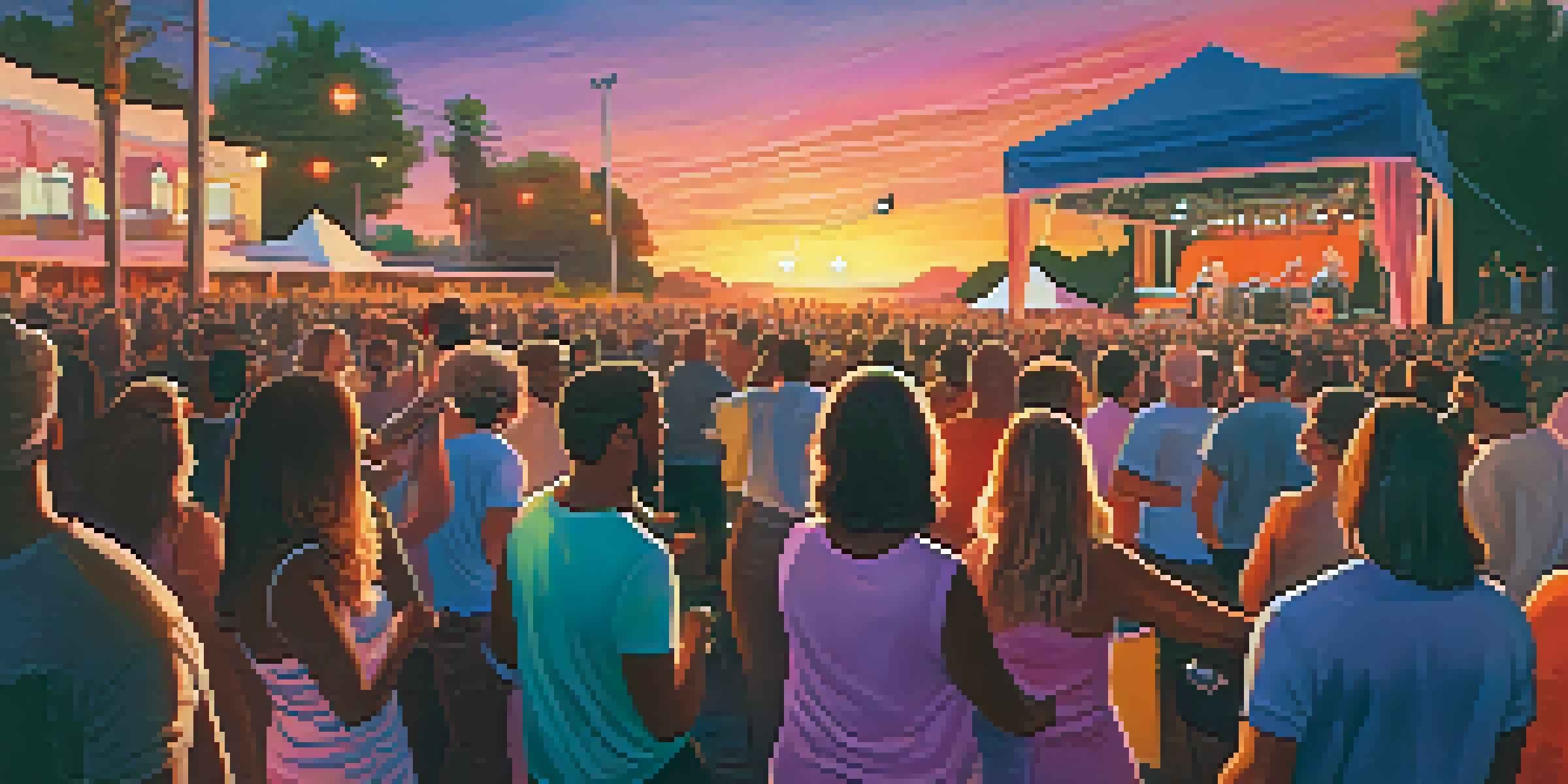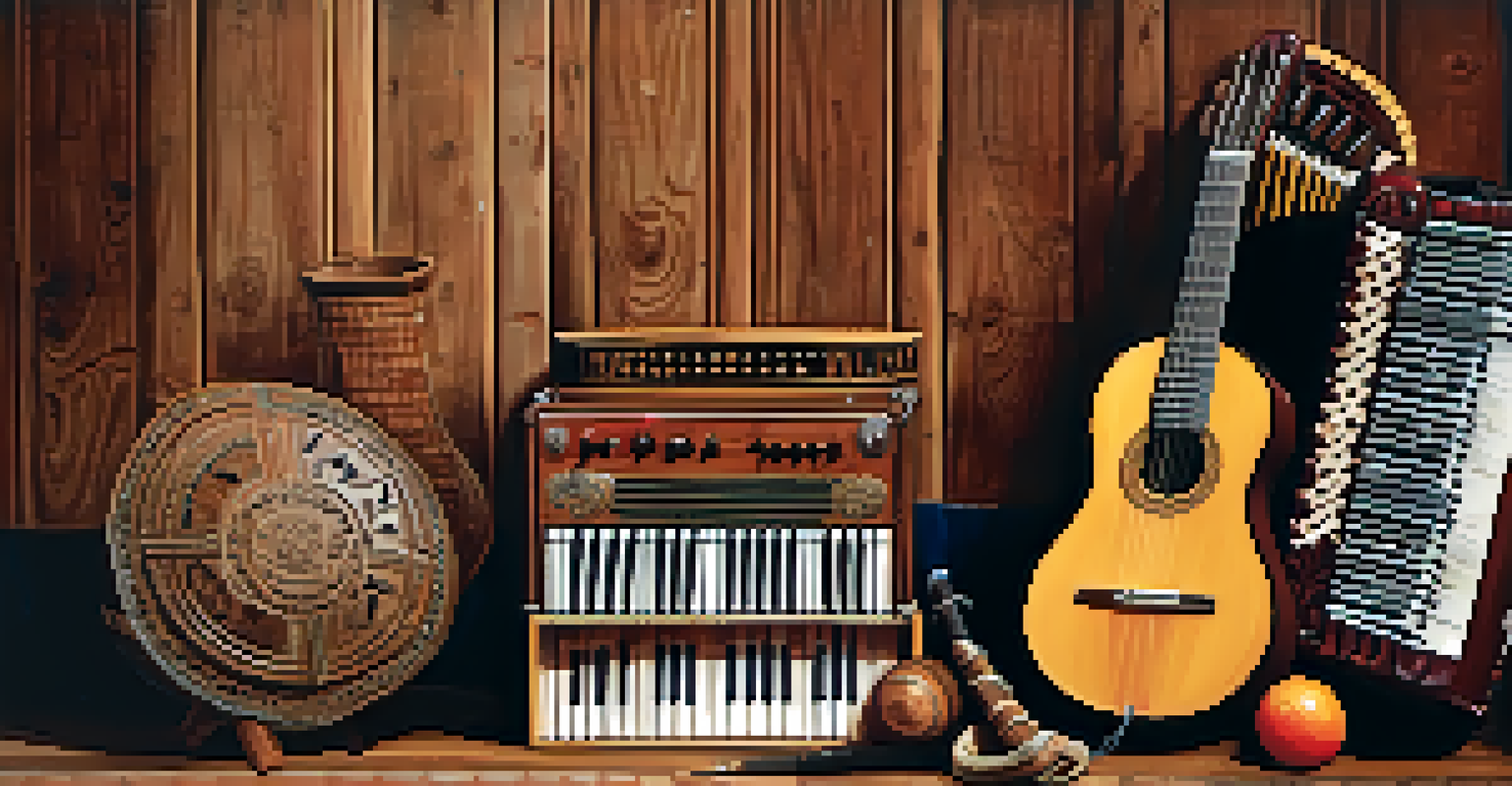Music and Identity: The Power of Lyrics and Storytelling

The Connection Between Music and Personal Identity
Music is a universal language that transcends boundaries and speaks to our hearts. It often reflects our experiences, emotions, and cultural backgrounds, shaping how we see ourselves and the world. When we listen to a song, we're not just hearing notes; we're connecting to the artist's story, which can resonate deeply with our own lives.
Music can change the world because it can change people.
For many, the genres they gravitate towards—be it hip-hop, country, or rock—can reveal a lot about their identity. For instance, a teenager may find solace in punk rock as a form of rebellion or self-expression. This relationship between music and self-perception can be transformative, helping individuals navigate their journeys of growth and self-discovery.
Moreover, music creates a sense of belonging. When we gather with friends at a concert or share playlists, we’re building connections over shared experiences. These shared moments can reinforce our identities, making music an integral part of who we are.
Lyrics as a Reflection of Personal Experiences
Lyrics are the heart of a song, often telling stories that mirror our own realities. Through relatable narratives, they can evoke emotions we didn’t even know were there. For instance, a breakup ballad might resonate with someone going through a tough time, providing comfort and understanding.

Many artists draw from their own lives, creating a bridge between their experiences and those of their listeners. Take Taylor Swift, for example; her lyrics often reflect her personal relationships and challenges, allowing fans to see parts of themselves in her stories. This connection can be empowering, helping listeners feel less alone in their struggles.
Music Reflects Personal Identity
The genres and lyrics we connect with often reveal our emotions and experiences, shaping our sense of self.
Furthermore, the emotional weight of lyrics can inspire listeners to embrace their own stories. When someone hears a powerful line that articulates their feelings, it can validate their experiences, fostering a sense of identity and individuality.
Cultural Storytelling Through Music
Music is a powerful vehicle for cultural storytelling, preserving traditions and histories through lyrics. Many genres, like folk or reggae, are steeped in cultural narratives that reflect the values and struggles of a community. By listening to these songs, we gain insight into the identities shaped by these stories.
Without music, life would be a mistake.
For example, Native American music often conveys themes of nature and spirituality, while traditional African music might focus on community and heritage. These narratives not only entertain but also educate listeners about different cultures, fostering empathy and understanding.
Through these musical journeys, we learn to appreciate the diversity of human experience. Engaging with cultural music can expand our worldview, reminding us of the rich tapestry of identities that exist around us.
The Impact of Music on Self-Expression
Music empowers individuals to express themselves in ways that words alone sometimes cannot. Through songwriting or simply selecting songs that resonate with them, people can articulate feelings and thoughts that might otherwise remain unspoken. This form of expression can be particularly beneficial for those who struggle to communicate their emotions.
For instance, a teenager might feel isolated and misunderstood but find solace in writing lyrics that capture their feelings. This act of creation not only helps them process their emotions but also allows them to share their unique perspective with the world. In this way, music becomes an outlet for self-discovery and personal growth.
Cultural Narratives in Music
Music serves as a storytelling medium that preserves cultural identities and fosters understanding among diverse communities.
Moreover, the act of sharing these musical expressions—be it through social media or live performances—can foster connections with others who share similar experiences. This shared vulnerability can strengthen bonds and create supportive communities, reinforcing one’s sense of identity.
Music as a Tool for Social Change
Throughout history, music has played a pivotal role in social movements, amplifying voices that may otherwise go unheard. Songs like 'Imagine' by John Lennon or 'Fight the Power' by Public Enemy serve not just as anthems but as catalysts for change. They inspire listeners to reflect on societal issues and consider their own identities within the larger context.
Artists often use their platforms to address topics such as racism, inequality, and environmental concerns, encouraging listeners to take action. For example, during the Civil Rights Movement, artists like Sam Cooke and Nina Simone used their music to highlight injustices and rally support for change. Their lyrics became powerful tools for mobilizing communities.
This transformative power of music can lead individuals to reevaluate their beliefs and engage with their identities in a more conscious way. By participating in movements inspired by music, people can align their personal values with collective efforts for social justice.
The Role of Music in Shaping Collective Identity
Music not only shapes individual identity but also fosters a sense of collective identity among groups. Whether it’s national anthems that evoke patriotism or protest songs that unite voices in dissent, music can create a powerful sense of belonging. It acts as a rallying point, bringing people together under shared experiences and emotions.
For example, the rise of hip-hop has created a global community that transcends borders. Artists from different backgrounds share their stories through this genre, promoting understanding and solidarity among diverse audiences. This collective experience can be a catalyst for change, as shared music fosters collaboration and empathy.
Music as a Catalyst for Change
Throughout history, music has empowered social movements, encouraging individuals to reflect on their beliefs and engage in collective action.
Thus, music becomes a powerful tool for community building. By celebrating shared stories and struggles through song, people can forge meaningful connections, reinforcing their collective identity while honoring their individual experiences.
The Future of Music and Identity Exploration
As technology evolves, so does the way we interact with music and explore our identities. Streaming platforms allow for an unprecedented variety of music to be accessed, enabling individuals to discover and connect with genres from around the world. This access can lead to a broader understanding of different cultures and identities.
Additionally, the rise of social media has transformed how artists share their stories and connect with fans. Platforms like TikTok allow users to engage with music in creative ways, fostering community and dialogue around identity. This democratization of music means that anyone can contribute their voice to the conversation about identity.

Looking ahead, the intertwining of music and identity will continue to evolve. As we embrace diverse sounds and stories, we can expect music to play an even more significant role in shaping who we are and how we connect with one another.